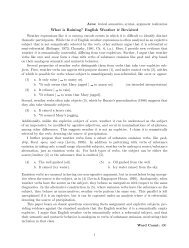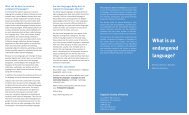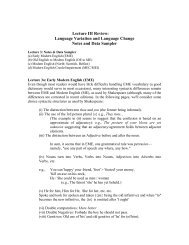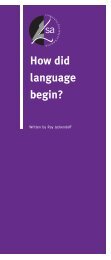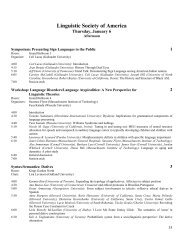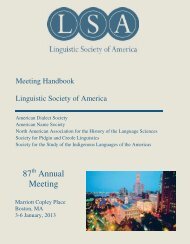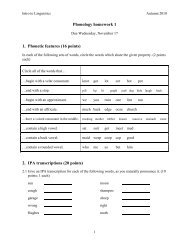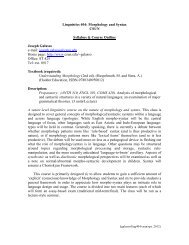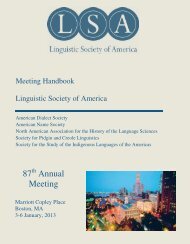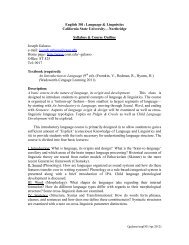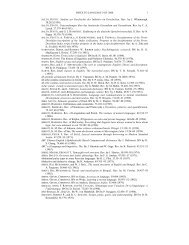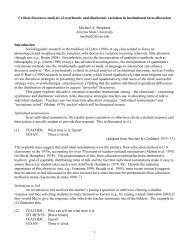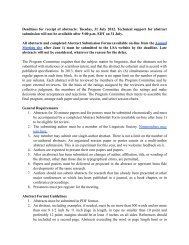Saturday, 6 JanuarySymposiumMissionaries and Scholars:The Overlapping Agendas <strong>of</strong> Linguists in <strong>the</strong> FieldPacific D2:00 – 5:00 PMOrganizer:Participants:Lise M. Dobrin (University <strong>of</strong> Virginia)Jeff Good (University at Buffalo, State University <strong>of</strong> New York)William Svelmoe (Saint Mary’s College)Courtney Handman (University <strong>of</strong> Chicago)Patience Epps (University <strong>of</strong> Texas, Austin)Ken Olson (SIL International)Daniel Everett (Illinois State University)With <strong>the</strong> contemporary rise in concern over language endangerment, academic linguists are taking a renewed interest in fieldwork and,in so doing, reconfirming <strong>the</strong>ir dependence on tools and information created by missionary institutions, particularly SIL International.The sociolinguistic situation <strong>of</strong> many languages is known to western linguists through <strong>the</strong> results <strong>of</strong> SIL-sponsored surveys anddisseminated through <strong>the</strong> authoritative voice <strong>of</strong> <strong>the</strong> Ethnologue, SIL's global language inventory. Academic linguists depend on fontsdistributed by SIL in order to digitally encode <strong>the</strong> language material <strong>the</strong>y collect in <strong>the</strong> field, and <strong>the</strong>y depend on SIL-produceds<strong>of</strong>tware (such as Shoebox/Toolbox) to organize and store <strong>the</strong>ir data. SIL linguists have taken a leading role in <strong>the</strong> currentdevelopment <strong>of</strong> standards for endangered language documentation; indeed, <strong>the</strong> language codes used by Ethnologue are now beingadopted as <strong>the</strong> International Standards Organization (ISO) standard for labeling languages. And like fieldworkers from o<strong>the</strong>rdisciplines, academic linguists regularly appeal to missionaries for practical assistance in <strong>the</strong> field (making contacts and selecting afieldsite, arranging housing and transportation, learning about <strong>the</strong> culture, etc.).Clearly, academic and mission linguists share certain agendas--an interest in language description and an interest in human beings,including those on <strong>the</strong> peripheries <strong>of</strong> modernity and world power. However, because <strong>the</strong>ir goals are ultimately distinct, <strong>the</strong> agendas <strong>of</strong>missionary and academic linguists overlap only partially. Academic linguists have more than once expressed concern that missionlinguists work counter to <strong>the</strong>ir moral agendas in some areas <strong>of</strong> <strong>the</strong> world. And <strong>the</strong> reliance on mission-sponsored tools is underwrittenby no guarantee that those tools will continue to be supported should mission goals for any reason be transformed. The divergentinterests <strong>of</strong> missionary and academic linguists is nowhere more apparent than in <strong>the</strong> diminishing deployment <strong>of</strong> mission linguists tothose languages that are least vital, and hence least in need <strong>of</strong> vernacular language religious materials--precisely <strong>the</strong> languages thatacademic linguistics now deems in most urgent need <strong>of</strong> documentation.This symposium acknowledges and explores <strong>the</strong> relationship between academic and mission linguistics through accounts <strong>of</strong> <strong>the</strong>ireffects on local people in particular field settings; evaluation <strong>of</strong> <strong>the</strong>ir resources, training practices, and organizational cultures; andsimilar topics. The orientation is forward-looking: to consider <strong>the</strong> implications <strong>of</strong> our partially overlapping interests for <strong>the</strong> future <strong>of</strong>basic linguistic research. Especially given <strong>the</strong> moral framing <strong>of</strong> <strong>the</strong> endangered languages agenda in academic linguistics, it isappropriate to ask whe<strong>the</strong>r it is desirable--or even possible--for field linguistics (and hence <strong>the</strong> core <strong>of</strong> <strong>the</strong> endangered languageresearch paradigm) to proceed in an academic setting without <strong>the</strong> support <strong>of</strong> mission-based infrastructure. In examining <strong>the</strong>seinstitutional issues we hope to assess <strong>the</strong> limitations and advantages <strong>of</strong> academic linguistics' reliance on its sister discipline at ahistorical juncture when fieldwork is <strong>of</strong> greater importance than perhaps ever before.91
Lise Dobrin (University <strong>of</strong> Virginia)Jeff Good (University at Buffalo, State University <strong>of</strong> New York)Endangered language linguistics: Whose mission?As <strong>the</strong> discipline <strong>of</strong> linguistics redoubles its efforts to document, understand, and support <strong>the</strong> world's linguistic diversity, academiclinguists are reconfirming <strong>the</strong>ir longstanding dependence on tools, methods, information, and facilities created by <strong>the</strong>ir missionarycounterparts, particularly SIL. But with linguistic work now <strong>of</strong>ten framed as a matter <strong>of</strong> human rights, endangered languages havebecome a moral cause. The time has thus come to reflect on how this partnership <strong>of</strong> convenience can be reconciled with academiclinguistics' own priorities and values. Is it desirable--or even possible--for endangered language research and development to becarried out independently <strong>of</strong> mission enterprises?William Svelmoe (Saint Mary's College)Missionary linguists or linguist missionaries? The tension between linguistics & evangelism in <strong>the</strong> SILThe earliest SIL/Wycliffe recruits were fundamentalist Protestants for whom linguistic training was a necessary evil, something oneendured in order to reach <strong>the</strong> more important goal <strong>of</strong> saving souls. However, mastering a field as complicated as linguistics required arigorous education far beyond what evangelical missionaries at <strong>the</strong> time customarily received. In time, and through a process <strong>of</strong>generational change, <strong>the</strong> organization underwent a radical shift. SIL now attracts pr<strong>of</strong>essionally trained linguists eager to unitepr<strong>of</strong>essional and intellectual goals with <strong>the</strong>ir religious commitments. But <strong>the</strong> tension remains, as recent discussions within <strong>the</strong>organization demonstrate.Courtney Handman (University <strong>of</strong> Chicago)Christianization & language ideologiesThe relationship between local language ideologies, people's attitudes about language function and use, and conversion to Christianityis especially consequential for endangered languages since many <strong>of</strong> <strong>the</strong>se are found in <strong>the</strong> remote areas that have long been attractiveto evangelistic organizations. Even when Christianity is practiced in local language contexts, beliefs about pragmatic constructs suchas sincerity or <strong>the</strong> representation <strong>of</strong> internal thoughts can shift in radical ways. I give a syn<strong>the</strong>tic overview <strong>of</strong> <strong>the</strong> literature on howChristianization and attendant practices such as literacy affect local language ideologies, situating SIL's goals and practices within thisbroader context.Patience Epps (University <strong>of</strong> Texas, Austin)Linguists & missionaries: An Amazonian perspectiveTaking <strong>the</strong> problem <strong>of</strong> language endangerment in Amazonia as a backdrop, I argue that <strong>the</strong> missionary endeavor is incompatible with<strong>the</strong> goals <strong>of</strong> language preservation and self-determination. Academic field linguists are increasingly aware <strong>of</strong> <strong>the</strong>ir responsibilities notonly to preserve and document endangered languages but also to respect speakers' rights to choose <strong>the</strong>ir own future. The missionaryendeavor, in contrast, takes as its starting point <strong>the</strong> assumption that 'we' have something that '<strong>the</strong>y' lack and are not complete without.Missionary linguists are also led by <strong>the</strong>ir premises to engage in coercion, as numerous examples from Amazonia attest.Ken Olson (SIL International)SIL International: An insider's viewMembers <strong>of</strong> SIL International are also simultaneously members <strong>of</strong> Wycliffe Bible Translators, which seeks to facilitate Scripturetranslation into <strong>the</strong> world's minority languages. SIL is incorporated as a nonecclesiastical organization in order to support <strong>the</strong>academic side <strong>of</strong> its work and to foster agreements with host governments, academic institutions, and international bodies such as <strong>the</strong>United Nations and UNESCO, with which it enjoys formal consultative status. In 1975, <strong>the</strong> allegation that SIL contributes to <strong>the</strong>destruction <strong>of</strong> indigenous cultures was formally brought to <strong>the</strong> Committee on Ethics <strong>of</strong> <strong>the</strong> <strong>America</strong>n Anthropological Association andwas found to be unsubstantiated.Daniel Everett (Illinois State University)On <strong>the</strong> LSA-SIL connectionSIL is ultimately a religious organization whose goal is to produce portions <strong>of</strong> <strong>the</strong> Bible in all <strong>the</strong> languages <strong>of</strong> <strong>the</strong> world so thatRevelations 7:9 and 5:9 might be fulfilled. I was an SIL member from 1976 to 2002 when I resigned, in part because <strong>of</strong> mymisgivings about SIL's training, advertisement, goals, methods, and institutional objectives. I discuss <strong>the</strong> nature <strong>of</strong> <strong>the</strong>se misgivingsand why I believe that although SIL continues to do invaluable linguistics research, it may be time for <strong>the</strong> LSA to develop an explicitpolicy concerning <strong>the</strong> role <strong>of</strong> SIL and similar organizations.92
- Page 1:
MEETING HANDBOOKLINGUISTIC SOCIETY
- Page 5 and 6:
Meeting RoomsSECOND FLOORFOURTH FLO
- Page 7:
• LSA: Business Meeting and Award
- Page 11 and 12:
LSAThursday, 4 JanuaryEveningWelcom
- Page 13 and 14:
Friday MorningLSAConstructions and
- Page 15 and 16:
LSAFriday, 5 JanuaryAfternoonInvite
- Page 17 and 18:
Friday AfternoonLSAModeling Acquisi
- Page 19 and 20:
LSARules for Motions and Resolution
- Page 24 and 25:
LSASaturday AfternoonSymposium: Par
- Page 26 and 27: LSASaturday AfternoonSyntactic Face
- Page 28 and 29: LSASunday MorningFirst Language Acq
- Page 30 and 31: American Dialect SocietyThursday, 4
- Page 32 and 33: ADSSaturday, 6 JanuaryMorningSessio
- Page 34 and 35: American Name SocietyThursday, 4 Ja
- Page 36 and 37: ANSFriday AfternoonForms of Address
- Page 38 and 39: ANSSaturday AfternoonHistorical Ono
- Page 40 and 41: Society for Pidgin and Creole Lingu
- Page 42 and 43: SPCLSaturday, 6 JanuaryMorningSpeci
- Page 44 and 45: Society for the Study of the Indige
- Page 46 and 47: SSILAFriday AfternoonPhonology and
- Page 48 and 49: SSILASunday, 7 JanuaryMorningSemant
- Page 50 and 51: Part 1: Thursday, 4 JanuaryPart 2:
- Page 52 and 53: Donca Steriade (Massachusetts Insti
- Page 54 and 55: Friday, 5 JanuaryPlenary AddressCal
- Page 56: Saturday, 6 JanuaryPresidential Add
- Page 59 and 60: Thursday, 4 JanuaryTutorialA Field
- Page 61 and 62: Thursday, 4 JanuarySymposiumContinu
- Page 63 and 64: Friday, 5 JanuarySymposiumApproache
- Page 65 and 66: Friday, 5 JanuaryDigital Poster Ses
- Page 67 and 68: Stephen R. Anderson (Yale Universit
- Page 69 and 70: David Bowie (University of Central
- Page 71 and 72: Sharon Peperkamp (CNRS/University o
- Page 73 and 74: Elena Guerzoni (University of South
- Page 75: Claire Bowern (Rice University)Morp
- Page 79 and 80: We discuss the analysis of the vowe
- Page 81 and 82: Brian Agbayani (California State Un
- Page 83 and 84: squiggly shapes). Disfluency made n
- Page 85 and 86: Adam Baker (University of Arizona)
- Page 87 and 88: final particle; this structure enco
- Page 89 and 90: Travis G. Bradley (University of Ca
- Page 91 and 92: demonstrated that 2-year-olds map n
- Page 93 and 94: Nancy J. Caplow (University of Cali
- Page 95 and 96: Sarah Churng (University of Washing
- Page 97 and 98: Jennifer Culbertson (Johns Hopkins
- Page 99 and 100: Scott Drellishak (University of Was
- Page 101 and 102: Marc Ettlinger (University of Calif
- Page 103 and 104: Scherre 2001 argue that the phenome
- Page 105 and 106: Cynthia A. Fox (University at Alban
- Page 107 and 108: structures to the double object con
- Page 109 and 110: Steven Gross (East Tennessee State
- Page 111 and 112: Heidi Harley (University of Arizona
- Page 113 and 114: equivalents. I argue that their sim
- Page 115 and 116: predictable, and/or restricted in d
- Page 117 and 118: Keith Johnson (University of Arizon
- Page 119 and 120: Andrew Kehler (University of Califo
- Page 121 and 122: comparative rate of acquisition acr
- Page 123 and 124: Pei-Jung Kuo (University of Connect
- Page 125 and 126: EunHee Lee (University at Buffalo,
- Page 127 and 128:
Brook Danielle Lillehaugen (Univers
- Page 129 and 130:
Martha J. Macri (University of Cali
- Page 131 and 132:
Spanish subjects with unaccusative
- Page 133 and 134:
Brad Montgomery-Anderson (Universit
- Page 135 and 136:
multi-ethnic configuration, and pos
- Page 137 and 138:
Natalie Operstein (University of Ca
- Page 139 and 140:
Nick Pharris (University of Michiga
- Page 141 and 142:
Anastasia Riehl (Cornell University
- Page 143 and 144:
Françoise Rose (CNRS-IRD) Session
- Page 145 and 146:
precedence also constrains stative
- Page 147 and 148:
use experimental and corpus techniq
- Page 149 and 150:
eads easily for astrophysicists.).
- Page 151 and 152:
domains of use are mostly complemen
- Page 153 and 154:
show that both concatenative and no
- Page 155 and 156:
Don Walicek (University of Puerto R
- Page 157 and 158:
positions. However, certain matrix
- Page 159 and 160:
Suwon Yoon (University of Chicago)



